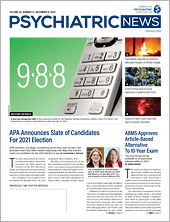Nearly 15% of Black youth in the United States may have symptoms of attention-deficit/hyperactivity disorder (ADHD), suggests a meta-analysis published in JAMA Psychiatry. Though estimates of ADHD prevalence among all races vary considerably, the most recent data from the Centers for Disease Control and Prevention suggest 9.4% of U.S. children have ever been diagnosed with ADHD.
“This work reinforces that our diagnostic tools are culturally inappropriate for Black youth,” said lead author Jude Mary Cénat, Ph.D., an assistant professor of clinical psychology at the University of Ottawa.
Cénat and colleagues pooled data from 21 separate studies of ADHD in the United States that included Black participants. The final sample included over 150,000 Black people; most studies involved children or adolescents, though a couple involved adults. The analysis of this complete sample yielded an ADHD prevalence of 14.54%.
Cénat noted that many of the studies involved youth from disadvantaged communities, which might skew the findings since low socioeconomic status (SES) is a risk factor for ADHD. His group’s analysis suggests that lower SES does not fully account for the higher prevalence of ADHD in Black people compared with people of other races.
“Being well off [financially] does not offer the same protection [from ADHD] for Black families as it does for Whites,” he told Psychiatric News. He noted one reason may be due to these families’ exposure to subtle or overt discrimination, which has adverse effects on Black people regardless of their socioeconomic status.
“These findings tell us that Black children are more likely to have symptoms of ADHD, but … it’s critical to think about the receipt of a clinical diagnosis, which is a child’s pathway to medication and other services,” said Tumaini Rucker Coker, M.D., M.B.A., an associate professor of pediatrics at the University of Washington and research director of the Seattle Children’s Center for Diversity & Health Equity.
Coker, who was not involved in this study, told Psychiatric News that numerous studies have shown that Black and other minority children receive fewer ADHD diagnoses and fewer prescriptions than White children.
She agreed that culturally appropriate screening tools are needed, but also suggested that many physicians do not ask the necessary questions to identify a potential problem in the first place.
“Make sure to ask the children or parents how they are feeling or about their school performance. Answers [to those questions] can give you important clues on whether you should run an ADHD screen,” she said.
Black parents may be hesitant to open up about potential ADHD in their children, Cénat said, due in part to fears of discrimination and stigma associated with an ADHD diagnosis. That’s why physicians need to embrace an anti-racist mental health care plan, he said.
He recently explained the concept in a
Lancet viewpoint article: “Anti-racist care goes beyond transcultural care; it integrates both cultural aspects and elements that allow for some form of reparation for the harm caused by racial discrimination, racial profiling, microaggressions, and racism.” His research group also developed some anti-racist training modules, posted
here.
The analysis was supported by a grant from the Public Health Agency of Canada. ■
“Prevalence and Risk Factors Associated With Attention-Deficit/Hyperactivity Disorder Among U.S. Black Individuals” is posted
here.
“How to Provide Anti-Racist Mental Health Care” is posted
here.
